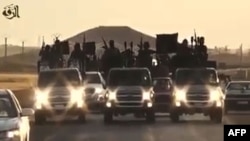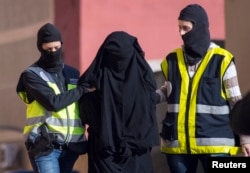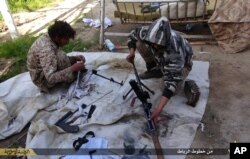For most militaries, let alone a terrorist group with aspirations of statehood, the mathematics would seem daunting if not impossible: a force of up to about 30,000 losing more than two-thirds of its fighters in just over a year.
That is the pounding U.S. military officials claim airstrikes in Iraq and Syria have dealt the Islamic State since August 2014, with the overall death toll put at 23,000.
"We're killing terrorists," Operation Inherent Resolve spokesman Col. Steve Warren told Pentagon reporters Thursday from Baghdad. "We're killing them every single day ... by the hundreds."
Yet the official U.S. intelligence estimates of Islamic State force strength in Iraq and Syria have remained practically unchanged from before the strikes began, staying between 20,000 to 30,0000, thanks to a steady influx of foreign fighters.
"The reason why they are still attractive to foreign fighters is one clever thing they did at the beginning," Kurdistan Regional Government intelligence chief Lahur Talabani told VOA. "They announced the caliphate."
That one move in June 2014 put the Islamic State, also known by the acronyms ISIL and ISIS, on a very different path than Osama bin Laden's al-Qaida, from which the group split.
"ISIS has achieved what bin Laden only promised," Bruce Hoffman, the director of Georgetown University's Center for Security Studies, told a Jamestown Foundation panel earlier this week. "It has effectively redrawn the map of the Middle East."
Appeal of urgency, action
At the time, though, the significance of the June 2014 announcement by Islamic State leader Abu Bakr al Baghdadi likely was lost on many Western leaders.
"I think they were probably thinking of ISIS along the lines of al-Qaida and various al-Qaida offshoots, and not sufficiently thinking of them as a budding empire essentially," said former CIA director James Woolsey.
"By forming a caliphate, it has attracted the allegiance of some young people, especially, that it otherwise would not have attracted," Woolsey told VOA. "There's something about serving a state, and particularly one that implements the ideals of the early roots of Muslims in Muhammad's time."
U.S. intelligence officials agree, saying the Islamic State's immediacy contrasts favorably with al-Qaida's slower and more methodical approach.
"ISIL's narrative of urgency and action appeals to would-be jihadists, particularly among younger populations," an intelligence official told VOA on condition of anonymity.
A report issued last month by the New America Foundation, a private research organization, backs that up. It found the age of the average male foreign fighter is 25, while typical female recruits are even younger, averaging 21 years of age.
Appeal of better life
Officials, analysts and even organizations that work with youth at risk of being radicalized warn it is not just the urgency and immediacy of the caliphate that makes it a potent tool for recruiting. They say Islamic State operatives also have become expert marketers, selling potential recruits on the aspects of the caliphate that appeal most to them.
While many Islamic State videos glorify the group's brutality and violence, its propaganda also focuses heavily on presenting an image of the caliphate as, if not a paradise, at least a place to establish a better life.
"ISIL continues to place importance on their propaganda to show an appearance of success that's not backed up by facts on the ground in Iraq and Syria," said U.S. Central Command spokesman Col. Pat Ryder.
U.S. officials say they are seeing signs of strain, especially as Kurdish forces make gains in the north of Syria and Iraq. And U.S. military and counterterrorism officials say the impact is starting to show.
"Recent steps taken by the international community to choke off the flow of foreign fighters to ISIL will impact the group's ability to replace their losses," a U.S. intelligence official said, adding, "It will take some time to gauge the results."
Strategy for defeating IS
Yet there are reasons for concern.
A report issued earlier this week by The Soufan Group estimates the number of foreign fighters flocking to the war zone in Iraq and Syria may have topped 31,000.
There also are doubts that simply degrading the Islamic State's fighting force is enough.
"Certainly individuals are being killed, individual weapon systems are being taken off the battlefield," said David Kilcullen, a former senior counterinsurgency adviser to the U.S. military in Iraq. "But in terms of its ability to function as a state, we've yet to actually target it effectively."
Defense Secretary Ash Carter has signaled that the U.S. is willing to do more to destroy not just the Islamic State group, but to further target the idea of the caliphate.
But critics say what they have seen so far is not enough, with some calling for more direct action against the Islamic State's self-declared capital in Syria.
VOA's Sharon Behn contributed to this story.






